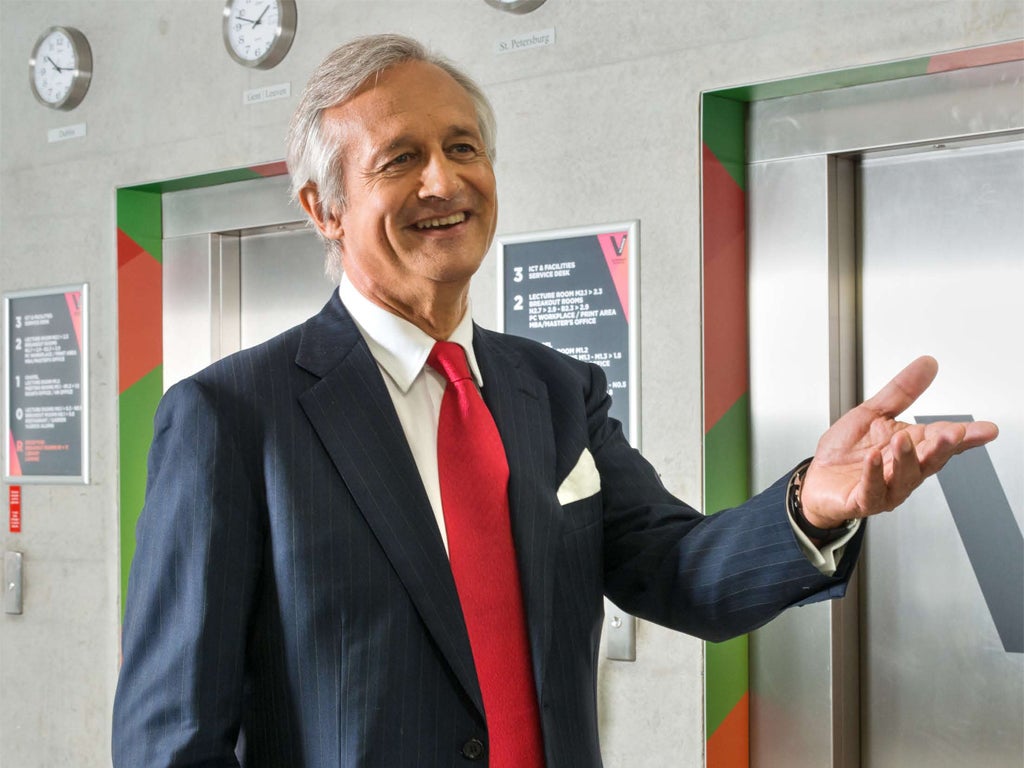Vlerick Business School: 'Our aim is to develop a coherent and focused brand'
The dean of Vlerick Business School explains why he has chosen to launch an all-encompassing review

Your support helps us to tell the story
From reproductive rights to climate change to Big Tech, The Independent is on the ground when the story is developing. Whether it's investigating the financials of Elon Musk's pro-Trump PAC or producing our latest documentary, 'The A Word', which shines a light on the American women fighting for reproductive rights, we know how important it is to parse out the facts from the messaging.
At such a critical moment in US history, we need reporters on the ground. Your donation allows us to keep sending journalists to speak to both sides of the story.
The Independent is trusted by Americans across the entire political spectrum. And unlike many other quality news outlets, we choose not to lock Americans out of our reporting and analysis with paywalls. We believe quality journalism should be available to everyone, paid for by those who can afford it.
Your support makes all the difference."In our country," says Alice in Lewis Carroll's Through the Looking-Glass, "you'd generally get to somewhere else if you run very fast for a long time, as we've been doing." "A slow sort of country!" replies the Red Queen. "Now, here, you see, it takes all the running you can do to keep in the same place. If you want to get somewhere else, you must run at least twice as fast as that!"
This excerpt has proved to be a key business lesson for Professor Philippe Haspeslagh, dean of the Vlerick Business School. It's certainly one his institution has taken to heart, having just invested €500,000 in a rebranding exercise, and a further €500,000 on an accompanying website, and a projected €6m establishing its new Brussels campus. "It's counter-cyclical, doing all this during a recession," Haspeslagh acknowledges. Especially, he adds, as Vlerick has thrown everything at the venture. "We wanted a professional and complete process."
As a result, the business school's "rebranding" is, in fact, an all-encompassing review of how it operates, generates revenue, teaches and, ultimately, how it is perceived in the business education market. "This is not about a logo, it's about how we live our brand," explains Haspeslagh. "It's about consolidating and communicating our brand values, and about making changes inside the school to align with those."
All of which could imply that Vlerick was previously struggling – but that isn't the case. The business school has two parent universities in Leuven and Ghent, but is run independently, gaining 30 per cent of its revenue from student fees and the remaining 70 per cent from executive education and business links. It has solid academic links internationally, and, because of its unique business structure, staff are engaged in the school's success. "About 30 – half – of our senior faculty members are partners in the school," explains Haspeslagh. "We have set up a professional partnership, just like a law firm. That means our senior faculty is dedicated to helping to grow and nourish the school."
So why splash money now? "The rebranding is not to fix a problem, it's to accelerate growth and update alumni and businesses on who we are and what we can deliver for them," says Haspeslagh. Some of the school's motivations were practical – for example, the name of the school was Vlerick Leuven Ghent Management School, but this was misleading since it also has campuses and programmes in St Petersburg, Beijing and Brussels. Other motivating factors were about ideology and ambition, extending the school's global reach. "But the most important reason is the increasing importance of brand to business schools," says Haspeslagh. "The product that all schools and universities sell is a big, one-time purchase for students – so trust in that brand is very important."
This, for other institutions, is a heavy statement. As Haspeslagh points out, some of the world's leading business schools, for all their marketing expertise, fail to generate a powerful brand of their own – let alone one that is regularly reviewed. "Our aim is to develop a coherent and focused brand. As business schools, we should learn from the business world to make sure that branding isn't just image creation but that it brings out the things that are distinct to our organisation."
Reappraisal will be vital to Vlerick's future. "The success of our rebranding will be measured in the growth of our student applications and in the development of our executive education programmes, but also in the growth of faculty candidates."
Haspeslagh also returns to the idea of "living" the brand. "The extent to which the brand is understood and implemented throughout the school will, to me, be the true mark of success. Our aim is to support individuals and companies to enjoy change, and to change proactively," he says.
Perceptions in the school have shifted, says Haspeslagh. Before the rebranding began "everyone was convinced we were changing fast and a lot – but when we really looked and benchmark ourselves against the best schools globally, we saw that changing reasonably fast only allowed us to stand still." It's the lesson of the Red Queen again: "You have to be willing to question everything if you want to move ahead."
Join our commenting forum
Join thought-provoking conversations, follow other Independent readers and see their replies
Comments